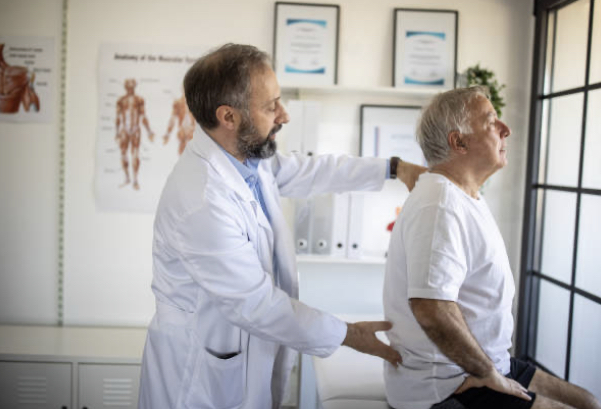What is a Degenerative Spine
Degenerative spine disease describes a condition where the structures of the spine undergo degenerative changes. This includes the vertebral bodies, discs, joints, and ligaments. While the spine naturally weakens as we age, we can still take action to delay or even possibly prevent a degenerative spine. Degenerative spine prevention means making sure that your neck and back are healthy, in the same way, you keep your heart and lungs healthy.
All the components of your spine, including the vertebrae, spinal discs, and connective tissues, need nutrients to function properly. This is why diet and exercise may help you avoid the painful conditions that accompany a degenerative spine. Read on to learn about the causes of a degenerative spine, prevention methods, and treatment options if your condition still develops after a course of nonsurgical therapies.
Degenerative Spine Causes
As the name implies, a degenerative spine is one that has weakened and deteriorated over time. Naturally, aging is the primary cause, but other factors, including obesity, overexertion, and illness can also contribute. Degeneration of the spine can occur in the facet joints or the spinal discs. Both of which are largely dependent on cartilage to function normally.
The gradual loss of moisture and durability in the spinal cartilage has harmful effects on the spine. Conditions such as facet disease and herniated or bulging discs can contribute to nerve compression and degenerative spine symptoms. These symptoms include numbness, weakness, and spine pain in the neck or lower back as well as pain in the arms, hands, legs, and feet. Pain in the lumbar (lower back) region of the spine can also result in radiating pain in the extremities.
Degenerative Spine Prevention
There are a few options available to help prevent the onset of a degenerative spine condition, as well as the associated degenerative spine symptoms. This includes:
- Exercise: To keep your spine as healthy as possible, take part in low-impact exercises like walking or swimming. Lightweight training and gentle yoga can also help your spine stay strong and flexible. Always check with your doctor before beginning an exercise regimen.
- Weight management: Stay disciplined about your diet. Eating foods that are high in fiber and low in fat will reduce body mass, which means your spine has less weight to support. Foods like fish, nuts, and leafy greens are high in omega fatty acids and antioxidants, both of which contribute to the health of joints and spinal discs.
- Avoid smoking and alcohol: The toxins and nicotine in cigarettes prevent your discs from absorbing vitamins and nutrients. Also, alcohol consumption can be detrimental to your mood and mask the degenerative spine symptoms you are experiencing, as it acts as a muscle relaxant.
Despite degenerative spine prevention, many still develop degenerative spine conditions. In fact, the majority of adults will have varying levels of spine deterioration. However, only a small portion of these individuals will experience painful nerve compression from the condition. According to the Spine Center, 40% of adults over 40 have at least one degenerative vertebral disc.
Degenerative Spine Treatments
If the chronic pain from this condition is unable to be prevented, a doctor will likely recommend managing your degenerative spine symptoms with conservative treatment. This is done before considering surgery. A degenerative spine treatment plan may include prescription or over-the-counter pain medication, chiropractic manipulation, physical therapy, core-strengthening exercises, heat massages, and ultrasounds.
In the likelihood that the pain from a degenerative spine condition persists despite conservative treatment, your primary care physician may suggest that you contact a specialist about your surgical options, like the board-certified surgeons at BEST Health System.
At BEST Health System, we use minimally invasive techniques to help treat degenerative spine conditions on an outpatient basis. Our procedure is done without the higher risks associated with traditional open spine surgery. Our dedicated team uses less than 1-inch incision and muscle-sparing techniques to treat the affected part of the spine.
BEST Health System Can Help
BEST Health System specializes in minimally invasive spine surgery. It is a safer and more effective alternative to traditional open back procedures. This form of procedure offers many benefits, including less risk of infection and no lengthy recovery. For more information on how BEST can help you find relief from chronic neck and back pain, contact us today.
